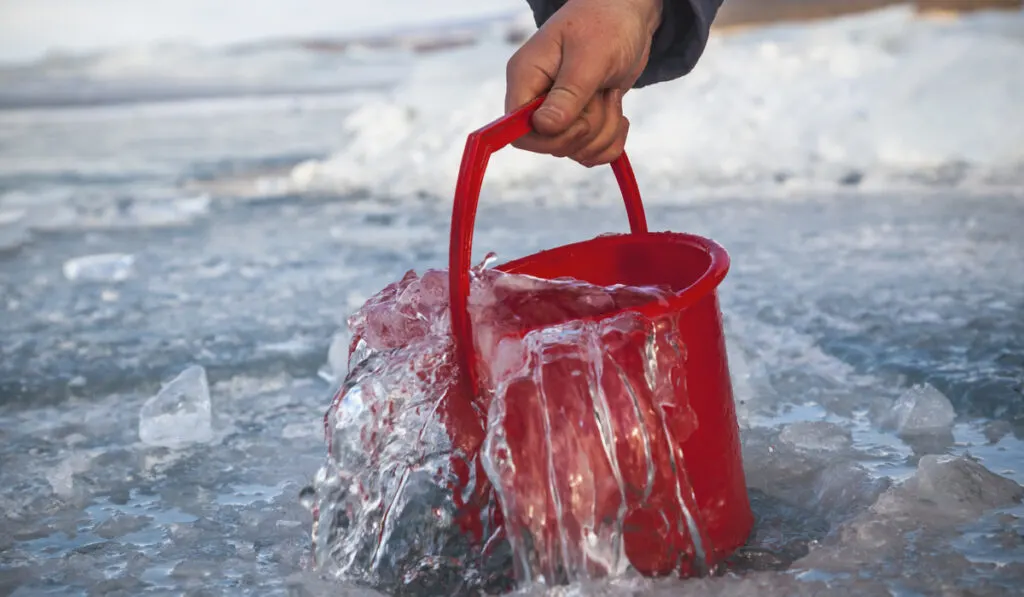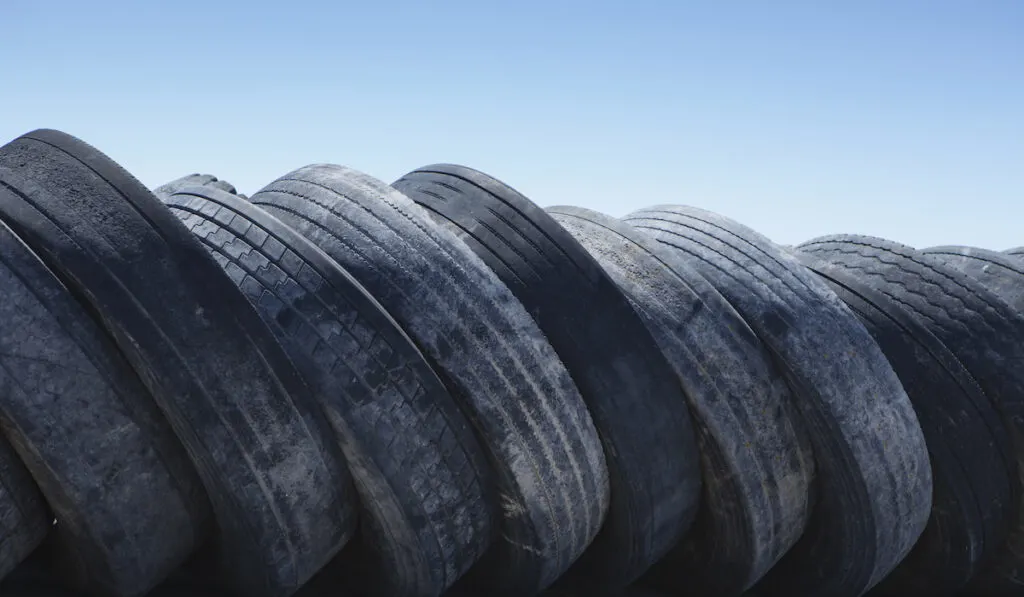Raising farm animals is fun, but caring for farm animals in the winter can be a daunting task. Trying to keep water buckets from freezing in the cold months can feel like a never-ending chore.
Water is a vital part of any farm, especially when there are animals involved. If the water supply is frozen, animals cannot consume the right amount of water and they can easily become dehydrated, even though it is not hot outside.

Thankfully, there are many ways to keep water buckets and troughs from freezing in the winter. Knowing these tested and tried ways to prevent water sources from freezing can make life on a farm just a bit easier, even in the winter.
Table of Contents
1. Remove Ice Chunks Completely and Often
When ice does form in a bucket, do not simply break the ice up and leave it in the bucket. Remove all ice chunks completely from the bucket. Ice forms quicker in a water source when there is already ice present.
Removing the ice will prevent new ice from forming as quickly. As long as you do it throughout the day, it can prevent the entire bucket of water from freezing.
Removing the ice in its entirety should be done multiple times a day to prevent as much freezing in the bucket as possible. In extremely cold weather, ice can form in short periods of time. If you can, check the water bucket regularly throughout the day.
2. Harness the Power of Dirt or Manure
Although it sounds odd, you can use dirt or animal manure compost to insulate the water bucket. Use a larger feeder tote, like a round muck tub, and a regular 5 gallon bucket. Place a layer of dirt or manure compost in the bottom of the tote. Set the bucket on top of that layer in the middle of the tub.
Fill the empty space around the bucket with more dirt, manure, or straw. Avoid using hay because your farm animal may eat it all. The dirt or manure or compost insulation around the water bucket will fend off freezing.
- ULTRA DURABLE – The plastic feeder bucket is made of tough polyethylene resin that is impact resistant, protects against warpage, and helps prevent stress cracks.
- VERSATILE USE – This premium utility bucket works great for pet and livestock feeding, but it can also function as a storage bucket or for transporting waste.
- HEAVY DUTY HANDLES – The plastic bucket features two strong poly rope handles built into the rim that allow this bucket to be easily transported.
3. Use Rubber Buckets
Many farm owners use plastic buckets for water because they are cheaper and extremely effective. They do, however, freeze relatively fast. Rubber water buckets offer extra insulation than plastic ones and it will take longer for the water inside them to freeze.
Consider replacing the plastic water buckets on your farm with rubber ones, at least in the winter. Rubber buckets will keep the water from freezing as fast as it would if it were metal or plastic.
- Five Gallon Capacity
- Heavy Rubber Construction
- Fits In Corners
- Steel Handle
- Good For Carrying Water and Feed
4. Move Outdoor Water Buckets Inside
If the water buckets are normally placed outside, try to find an area to put them that is inside of the barn or other enclosure that is out of the elements. Water in buckets outdoors in the winter will freeze more quickly than water inside a stall or barn. Make sure your animals are still able to get water whenever they get thirsty.
5. Repurpose Old Tires as Bucket Insulators

Old tires from cars or trucks do not have to be thrown out because they can be repurposed around the farm, especially to help insulate water buckets! Lay the tire flat on the ground, put down a dirt layer, and place the bucket inside.
Use bedding, straw, or other material to add extra insulation and keep the bucket sitting upright. The tire, along with the added insulation, should prevent the water bucket from freezing too quickly.
6. Insulate Water Buckets Yourself
You can also use a few supplies to insulate water buckets by yourself. You will need a safe insulation material, like foil insulation, and some duct tape. Do not use any kind of fiberglass insulation material for use around animals.
Wrap the bucket, on the outside, in a few layers of the animal-friendly insulation material. Secure it with duct tape, completely covering the insulation material while also securing it to the bucket. This should help to delay the water from freezing altogether, or at least long enough for you to remove any ice that forms.
7. Buy Insulated Bucket Holders
If you do not want to have your animal’s water bucket on the ground, insulated bucket holders might be the answer you are looking for.
These holders mount directly to the wall and they can be used year round, regardless of the weather. The bucket simply sets down inside the insulator and helps keep the water warm enough to prevent freezing.
They also come with a heat retention lid that can be used when horses are not stalled or using the bucket. This is a great option if you want the added insulation but do not want an electric heat source.
- Durable impact resistant poly construction with UV protection
- and injected with heavy insulation to help prevent water from freezing.
- Heavy duty 5 gallon bucket is included.
8. Use a Saltwater Mix in a Bottle
Saltwater freezes more slowly than plain water, so the theory here is that the saltwater solution in a bottle will bobble on the top of the water in the bucket.
The constant movement, along by the movement produced with the animal inadvertently moves the bottle when drinking, and should keep the water from freezing completely.
Mix salt with water and fill a 20-ounce bottle between one half and three-quarters of the way full. Make sure the lid is tight and place the salt water bottle in the bucket of water and watch the magic happen.
9. Change the Water Bucket Out Regularly
It may seem simple, but to keep a water bucket from freezing, you could try switching it out in intervals throughout the day. Each time you go to the barn, just carry a fresh bucket of water with you and switch them out.
This may not be time-effective if you are not free multiple times throughout the day. This is, however, one of the easiest and cheapest ways to keep water buckets from freezing in the winter.
10. Invest in Heated Buckets
While it may seem like an obvious solution, many people balk at the idea of using a heated bucket.
Yes, it does cost about 5 times the cost of a basic 5-gallon water bucket, but the perks are worth the cost to many farm animal owners. They come with a metal spring-covered cord to prevent chewing and they are extremely safe despite many animal lover’s misgivings.
The protected cord can be secured to the stall wall to keep it from causing any issues.
The heated mechanism in the bucket keeps the water inside warm enough to prevent freezing but not hot enough to harm an animal. The heating element does not come in direct contact with the animal, so there is no risk of shock.
- OVERHEATING PROTECTION – This water heater is thermostatically controlled with over-temperature protection to prevent water from being overheated.
- ULTRA DURABLE – The plastic bucket is made of highly durable polyethylene resin that is impact resistant, protects against warpage, and helps prevent stress cracks.
- CAPACITY – This bucket holds and heats up to 16 Gallons.
- ANTI CHEW POWER CORD – This has a chew-proof sheathed power cord that measures 6 inches.
- SAFE DESIGN, CSA & UL LISTED
11. Use a Beverage Cooler as a Water Bucket
You know those beverage coolers than sports teams dump on their coaches after a big win? These water coolers can be used as buckets on farms during the winter! Remove the lid, fill the bucket with warm to lukewarm water, and make sure the tap at the bottom is closed.
If you hang it, make sure the tap is positioned at back, away from the animal’s reach. The cooler should keep the water warm for a spell and then prevent freezing as it cools.
No products found.
Final Thoughts
Keeping water buckets from freezing on a farm is not an easy task, but it can be done!
Whether you invest in some costly heated buckets or insulators, or design your own and use items already on your farm, there is a way for you to prevent freezing water in buckets. The less the water buckets freeze, the more water your animals are able to drink, and the healthier your farm will be.
